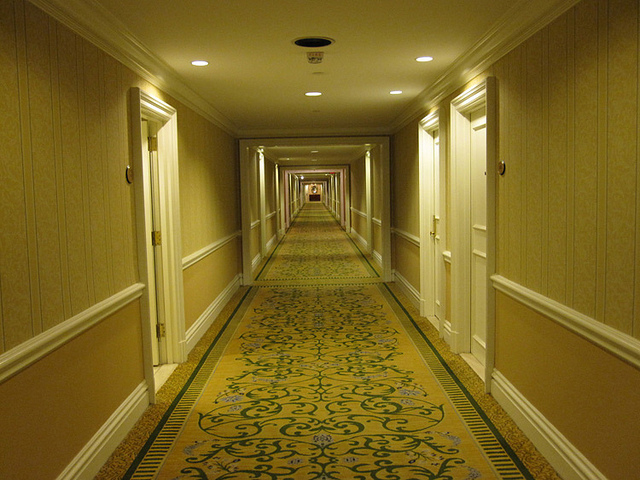Emma Sloley
She is so much smaller than she looks on TV. She can tell they’re all thinking it, because they seem emboldened now that she is here in the flesh and not just some idealized projection in pixels with the power to sideline them. These men are nobodies, even though they are busy fronting as somebodies, and she is the star, but they have the upper hand now, in this fancy D.C. hotel suite with its darkened windows and its sinister security detail in black suits stationed on either side of the door.
The suite is littered with debris: room-service trays abandoned at wanton angles on beds and tables, crumpled cigarette packets, a dozen different beverages. The men pace in their wrinkled shirts and flat-front pants, meaty hands clenching sheaves of paper or phones or notepads, patiently at first and then very impatiently going over the notes with her. Repeating the names and the talking points until she wants to scream, to cry, to jump out the window that probably doesn’t even open. They invade her personal space, looming with mannered menace over her bowed head and hunched body, fanning the papers in her face in exasperation, exchanging eye-rolls that are designed to be intercepted. Why won’t she learn? Why is she so fucking dumb? What have they all got themselves into?
In nervous misery, she palms the cue cards. They mean nothing to her, may as well be written in some dead language. Gulping water, her homecoming-queen coif wilting under the interrogation, she feels increasingly panicky. Where is her husband, her children? Anyone to pull her back to Earth and stop this feeling of free-falling through space and time. The adulation of the crowds, yes, she admits it has felt beautiful beyond anything she had ever experienced. But she has no access to the euphoric clamor of the town halls and convention centers in this stuffy room, with its magnificent view over the National Mall that none of its inhabitants has even glanced at. She closes her eyes for a moment, the lids stained with fatigue, distressed finally at how ugly it has all been and how she has occupied a not insignificant place at the center of that ugliness.
“You do realize the debate is in two days, right? Just making sure we’re all on the same page here. That we all understand what’s at stake, hmmm?”
He is right in her face now, Jim the communications something or other, and his breath smells like sushi and stale coffee.
“No one likes a bully.” She speaks without thinking, a reflex from countless conversations with her second-youngest son. But this man stares at her with such a mixture of incredulity and venom that she wonders if he’s going to hit her.
“What was that?”
She licks the last of the garish lipstick from the press conference off her dry lips.“I’m well aware the debate is in two days’ time. Thank you, Jim.”
“Well, that’s terrific news.” If he really were one of her children, she might have scolded him. Sarcasm is the lowest form of wit, don’t you know? But he is not her child. She is their child, and she is failing miserably. Jim sighs aggressively.“OK, Bryce, you play Paul. Let’s go again!”
She rises from the sofa and picks up her new $800 leather purse. “Excuse me. I need to use the powder room.”
She is the only woman in the room and they can’t deny her this simple, human request, yet she feels a collective impatience and even disgust directed at her, at her unknowable body with its insistent bladder,just like their annoying wives and girlfriends back home. Jim waves dismissively.
She locks herself in, and after she’s finished peeing she just sits there for a while, her mind as empty as her bladder. Glancing around the bathroom, her gaze rests on a small frosted window,which faces not outside but to the adjoining suite next door. After she has wiped and washed her hands she goes to the window and is surprised to find it swings open. She stands on tip-toes and peers in. The room next door is dim, lit only by some green digital device on the desk by the bed. She has given birth five times in her life, and she knows the only way to get through something painful that must be endured is not to think about it but to let it wash her along. In this spirit, she drags the makeup mirror stool over to the window, drops her handbag and shoes over, then hoists herself through the opening. It’s a tight fit, but she slithers through the birth canal and is delivered into a world hushed and empty.
She doesn’t have much time. She grabs a white toweling robe, ties it around her waist and hurries through the room, cracking open the door and peering each way down the corridor. The security guard in the hall has his head tilted away from her, and she darts in the direction of the elevators.Her spine stiffens in anticipation of the shout and thudding feet, but she makes it inside the elevator, her breath shallow and ragged. When she reaches the lobby, she puts her shoes on, leaves the robe puddled on the elevator floor,and walks out into the street.
There is a subway entrance a block away, but she is terrified of the subway. She comes from a small town where everyone drives pickup trucks. She could catch a cab, but where to? It’s not like a taxi will take her on the interstate.So she just walks, putting as much distance as she can between herself and the hotel; the waiting men; the life she never asked for but has loved, in its way.She keeps expecting someone to recognize her, but with her dark sunglasses and her hair loose she could be any anonymous commuter.
And it is the most beautiful feeling, to be free and unseen again,better than the crowds and the thunder of applause; better even than being loved.
Emma Sloley’s fiction and creative non-fiction has appeared in Yemassee, Catapult, the Tishman Review, Structo, and The Masters Review Anthology, among many others. Her debut novel, DISASTER’S CHILDREN, will be published by Little A Books in Fall 2019. Find her on Twitter at @emma_sloley.



